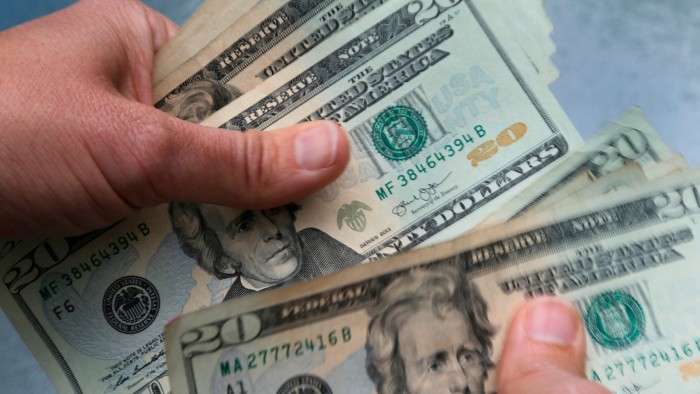Stay informed with free updates
Simply sign up to the Currencies myFT Digest — delivered directly to your inbox.
The dollar hit a two-year high against major currencies on Monday, with the pound the biggest faller, after strong US jobs data late last week led traders to slash expectations for further interest rate cuts by the Federal Reserve.
The dollar index, which tracks the US currency against the yen, euro and other major currencies, reached its highest level since November 2022.
The US payrolls report on Friday showed 256,000 jobs were added in December, blowing past consensus estimates and casting “further doubts on the need for the Fed to keep lowering rates this year”, said MUFG senior currency strategist Lee Hardman.
Swaps markets now expect just one quarter-point cut this year, with some analysts even predicting that the easing cycle is over.
US stocks, which sold off on Friday after the data release, were poised to fall again at the Wall Street open, with S&P 500 index futures down 0.9 per cent and those for the tech-focused Nasdaq 100 down 1.3 per cent.
The pound fell a further 0.8 per cent to $1.211, a 14-month low, faring the worst among G10 currencies and continuing a bruising period of trading for UK assets after last week’s gilt sell-off.
UK government bonds weakened in early trading, pushing the 10-year yield up 0.05 percentage points to 4.89 per cent, approaching last week’s 16-year high. Gilts have suffered as a global bond sell-off mixes with concerns about the UK’s economy.
“For a concrete turnaround, we will need to see either a commitment to reduce spending or a softening in services inflation on Wednesday,” said William Vaughan, a bond portfolio manager at Brandywine Global.
Asia-Pacific equities also declined on Monday. “People are surprised by the economic strength in the US,” said Jason Lui, head of Asia-Pacific equity and derivative strategy at BNP Paribas. “With US interest rates so high you will have a liquidity drain in Asia, with capital flowing to the US or staying there.”
Australia’s S&P/ASX 200 index fell 1.2 per cent, while South Korea’s Kospi declined 1 per cent. India’s Sensex fell 1.3 per cent. Japanese markets were closed on Monday.
“Emerging market equities traditionally perform better when US interest rates are lower,” said Sunil Tirumalai, head of Asian equity strategy at UBS. “The Fed not cutting and weak currencies means less room for Asian rate cuts.”
Hong Kong’s Hang Seng index declined 1 per cent, while mainland China’s CSI 300 weakened 0.3 per cent.
Mainland Chinese equities have steadily declined in recent months as hopes for a bazooka-style stimulus from Beijing fade and concerns over the economic impact of Donald Trump’s second term hit the market.
“Some stimulus measures have been a positive surprise,” said Tirumalai, who acknowledged China was still in a “bear market”. “The extension of the trade-in scheme to a wider array of consumer goods for example came earlier than we thought.”
Oil prices rose to a four-month high after the US announced sweeping new sanctions on Russian oil on Friday. Prices for Brent crude, the international benchmark, climbed 2.3 per cent to $81.65 a barrel.


